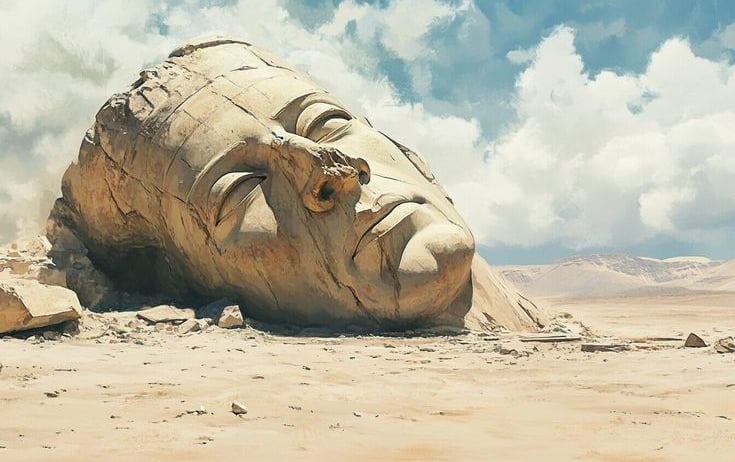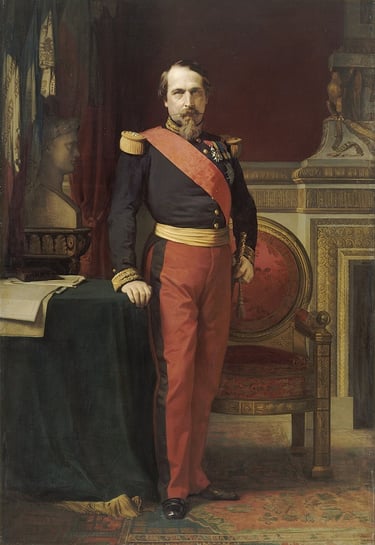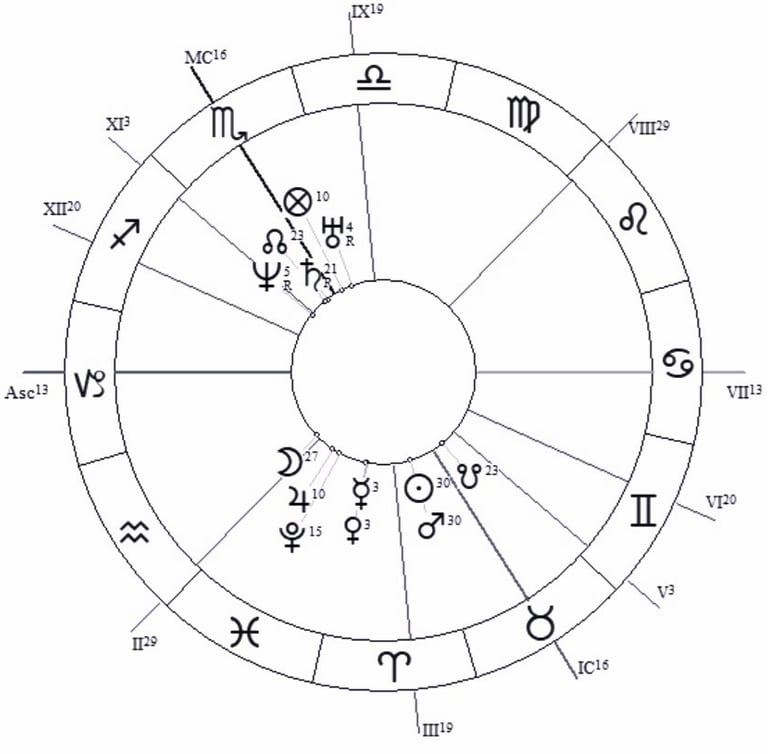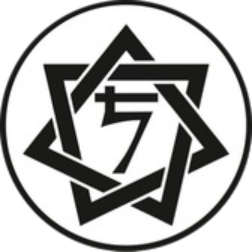THE FALL OF THE EMPIRE
Birth chart of the French emperor Napoleon III - the last emperor of the French Empire.


The Fall of the Empire
Every era births its own Ozymandias. Striving for dominion, he yearns to immortalize his name through the ages — in monuments, art, and chronicles. Yet... centuries supplant one another, and from former glory and grandeur, only shattered remnants remain, buried beneath heaps of silently reposing sands from a distant, often forgotten past. At times, these haughty monuments lie in the hush of millennia, deep within the strata of history, nameless and untitled, awaiting archaeological discoveries, scholarly inquiries and poetic embellishments. Monuments to arrogance, reduced to dust or entombed by Time itself. Percy Shelley majestically captured this in the concluding lines of his renowned sonnet "Ozymandias":
‘Nothing beside remains. Round the decay
Of that colossal Wreck, boundless and bare
The lone and level sands stretch far away.’
Shelley drew the foundation of "Ozymandias" from the words of Diodorus Siculus, describing an inscription on a statue unearthed in the Egyptian sands:
‘King of Kings Ozymandias am I. If any want to know how great I am and where I lie, let him outdo me in my work.’
Shelley not only built the sonnet's central idea upon these words but also transformed King Ozymandias into a traveller from an antique land, revealing to the reader the notion of inevitable downfall, inexorably following claims to dominion — the desire to conquer the world entire, bending it to one's own hubris. We see echoes of this in history, too often dismissed with disdainful pride by each successive ruler who fancies himself a new Ozymandias.
Time is merciless. Its sway extends not only over rulers, emperors, or kings, but over the entire world — over small nations no less than vast empires that once sprawled across immense territories, bounded only by the ambitions of their sovereigns and the resistance of those few who dared defy the will of the mighty.
What really happened to those whose shadow once loomed over nations and empires? What happened to the Persian king Xerxes I, who sought world domination and, in his blind pride, ordered the sea to be whipped with rods when a storm destroyed the bridges across the Hellespont? What happened to the Persian Empire, one of the greatest in history? Obviously, the same that happened to the Roman Empire, which once stretched across significant territories of Europe, the Middle East and Africa. Empires and rulers followed one another in an endless succession, and it was fortunate if their reign left behind a good memory rather than a bloody trail formed by a mad attempt to exalt themselves above the whole world. Sargon the Great and Hammurabi, Ashurbanipal and Nebuchadnezzar II, Thutmose III and Ramses II, Alexander the Great and Julius Caesar, Caligula and Nero, as well as many, many others — tyrants, emperors, kings and rulers — are now just names whose legacy has rarely survived the centuries. As the band Kansas sang in 1977:
‘All we do, crumbles to the ground,
Though we refuse to see.
Dust in the wind,
All we are is dust in the wind…’
At times, providence grants us a profound opportunity — to glimpse the future of a given empire or nation. Not so much to alter it, as to prepare for it. Sometimes, we can discern this future in the nativity horoscopes of those few directly entwined with the fate of the country or empire: rulers, emperors or kings. After all, the fate of millions depends on their actions.
Did the future president of the Second French Republic — Charles Louis Napoleon Bonaparte, or Napoleon III — know that he was destined to become France's last monarch? Unlikely. But had there been a court astrologer in his entourage bold enough to speak this truth, defying the fear of beheading by the French favorite — the guillotine — perhaps we would behold a different France today. However, no such astrologer graced his court, which is hardly surprising for France as a whole. Astrology has too often skirted these lands. And yet, if Napoleon III had possessed a court astrologer, that seer might have advised him thus: ‘Louis, under no circumstances should you restore the monarchy!’ Then, producing a worn sheet of hand-calculated nativity, he would demonstrate precisely why this should be avoided.


NAPOLEON III


Charles Louis Napoleon Bonaparte was born on April 20, 1808. Of course, this is not that Napoleon Bonaparte who fled across Europe from the Russian army, but his nephew — Napoleon III. He entered history as France's first democratically elected president and the last monarch of the French Empire. The latter concerns us most in the context of our theme.
Context must always frame our delineation. Unlike modern astrologers, we cannot delineate everything indiscriminately, hunting for the unclear by unclear means. We must know precisely what to examine and seek. Thus, we shall not dwell at length on all facets of Napoleon III's nativity, for we aim to reveal only a small yet profoundly significant slice of his natal chart — one that any sensible astrologer, upon seeing, would counsel Napoleon III against restoring the monarchy.
A word on the birth time. The horoscope below is drawn from astro.com and bears a Rodden Rating of "A", rendering it highly accurate. However, even without precise birth time, employing the technique of placing the Sun on the Midheaven would not hinder our conclusions, as you will see, though by a slightly different path. For the ingressions of the Sun and Mars play a pivotal role here.
«My name is Ozymandias, King of Kings:
Look on my works, ye Mighty, and despair!»
Percy Bysshe Shelley, Ozymandias.


20.04.1808, 01:00 (GMT +0:09:20), PARIS, FRANCE
We shall omit a detailed examination of Napoleon III's temperament, which would be crucial if we were interested in his mode of action in the world. After all, he not only participated in several conspiracies and revolution, but orchestrated a coup d'état that made him monarch and revived the empire. One might expect a man with a pronounced choleric temperament, for choleric nature is marked by action first and reflection second — do, then think — a trait of its hot and dry essence, where reason flickers only as the heat cools post-action. This would seem fitting for revolutionaries and warriors. Yet it is not so. Were we to delve into temperament, we would be surprised to find a blend, with a predominance of... melancholy - the desire to possess and to hold. The Ascendant and its ruler exhibit a starkly melancholic nature, while the Moon's quarter imparts phlegmatic qualities, and the Sun's position sanguine, admixed with the hot nature of Mars, with which it conjoins. Only Mars, as lord of the geniture and essentially the strongest planet in the nativity, bears a vivid choleric nature — hot and dry, in the hot and dry sign of Aries, and in the heart of the hot and dry Sun. One might think this a balanced admixture of temperaments, beneficial especially for health, as no single humor dominates, nor is there humoral deficiency, which often underlies chronic ailments. Yet this is not the case.
Behold Mars. He is not merely lord of the geniture but the most influential planet in the nativity. Why? Because Venus, Mercury, Saturn, and the Sun all reside in signs of his domicile. He rules them all. They obey and follow him. Whatever transpires in Napoleon III's life, he will resolve it via Mars — through coups, wars, and revolutions. This subtle point, despite melancholy slightly outweighing the rest, thrusts choleric Mars to the forefront of his existence - conquer, to possess and retain. Even Saturn, seemingly on the cusp of an angular house, submits to Mars in the cadent third. We might call him a Gray Eminence, but no — this is a resplendent cardinal, in the very heart of the Sun. Cazimi. Rendering Mars extraordinarily potent and mighty in the nativity. Nothing will halt him. Is it any wonder, then, at the tumultuous events of his life — revolutions, coups, power seizures, and wars?
Were this not an emperor but an ordinary man, we might see one who tackles all life's hardships through force. This does not imply fame or renown. We must consider not only context but the circumstances of birth and life. He might well become a notorious instigator of riots or tavern brawls, not an emperor, for he was not born into monarchy. This is the oft-forgotten common sense in modern astrology, which eagerly elevates anyone with strong indicators — like royal stars — to social pinnacles.
But what of the monarchy, you ask? Why did Napoleon III not refrain from reviving the Second French Empire in 1852? Here we turn to symbolism.
The Sun is not merely the visible symbol of divine light in the world. In a more earthly, pragmatic sense, it is the chief center of life, thus associated with the heart in the human body, the capital in a state or empire, and those around whom all revolves—in a nation, firm or organization, community. For an empire, it is the emperor. For a company, the leader. But the Sun, as symbol of kings, also symbolically aligns with empire and royal power. With monarchy. This is one of its natural significations. Stars lying on the ecliptic — the Sun's annual path across the heavens — are thus called royal, as the Sun traverses its yearly course through them. Not due to their size or hue, but their bond with the Sun — symbol of kings. Hence their import, not always tied to power and rule, but at times to fame in some sphere, even if minor compared to state scales. One might be a construction brigade foreman or ship or aircraft captain with such stars, though not necessarily. Symbolism is primary in astrology. Rigid systemic meanings represent the greatest distortion, closest to modern astrology. The celestial art will find its unique way to reveal answers or unveil the future.
Note the Sun — symbol of monarchy — in conjunction with Mars. Essentially, this is a very strong Sun, in its exaltation or elevation. Mars exalts the Sun, and the Sun dwells in Mars' domicile. Mutual positive reception binds them. But Mars, as the nativity's chief planet — essentially himself — exalts the Sun, deeming it panacea and life's raison d'être. This he places on his life's pedestal. Seeing this and knowing we face a royal scion, not a commoner, we grasp that monarchy and power will ever rank first in his life. This explains why Napoleon III could not, in a sense, act otherwise than attempt to revive the monarchy. For him, it is life's Eden — that paradise reflected in exaltation. In simpler terms, these are our rose-tinted glasses, through which we view something, blind to flaws or threats.
Nevertheless, beholding this configuration, as court astrologers we would still advise: ‘do not revive the monarchy!’ Why? For several reasons.
First, despite Mars' proximity to the Sun, they do not conjoin before exiting the sign. Second, though Mars resides in the Sun's heart — in monarchy's heart — upon changing signs, he enters his detriment in Taurus from domicile in Aries, while the Sun loses exaltation dignity immediately upon following into the next sign, as both atr at the sign's end. A symbolic end to monarchical order — the expulsion of monarchy. For in this nativity, Mars and Sun are one. One departs, the other weakens. As indeed occurred, for the monarchy ceased the day after Napoleon III's capture in the Franco-Prussian War. Exile of the emperor and fall of the empire. A profoundly symbolic end to monarchy.
Could it have been otherwise? Who knows... History admits no subjunctive mood. Viewing Napoleon III's nativity, it is hard to imagine him acting differently, not striving to revive what he deemed his supreme ideal — life's panacea. For when Napoleon III ascended as president, the French Empire no longer existed — only the French Republic. But had Charles Louis Napoleon Bonaparte asked us whether to revive the empire as his uncle Napoleon I had, we — gazing at the impending ingress of Sun and Mars from Aries into Taurus in his native chart — would declare, despite the looming guillotine, that ‘this attempt would be the empire's last, perishing with you, Вrother Louie, Louie, Louie…’. And thereafter, we might hear the characteristic click of that famed French invention's mechanism, observing from the other side of life the fate of this newfound Ozymandias, recalling Shelley:
I met a traveller from an antique land
Who said: “Two vast and trunkless legs of stone
Stand in the desert . . . Near them, on the sand,
Half sunk, a shattered visage lies, whose frown,
And wrinkled lip, and sneer of cold command,
Tell that its sculptor well those passions read
Which yet survive, stamped on these lifeless things,
The hand that mocked them, and the heart that fed:
And on the pedestal these words appear:
‘My name is Ozymandias, king of kings:
Look on my works, ye Mighty, and despair!’
Nothing beside remains. Round the decay
Of that colossal wreck, boundless and bare
The lone and level sands stretch far away.”
Percy Bysshe Shelley
Subscribe to our blog



